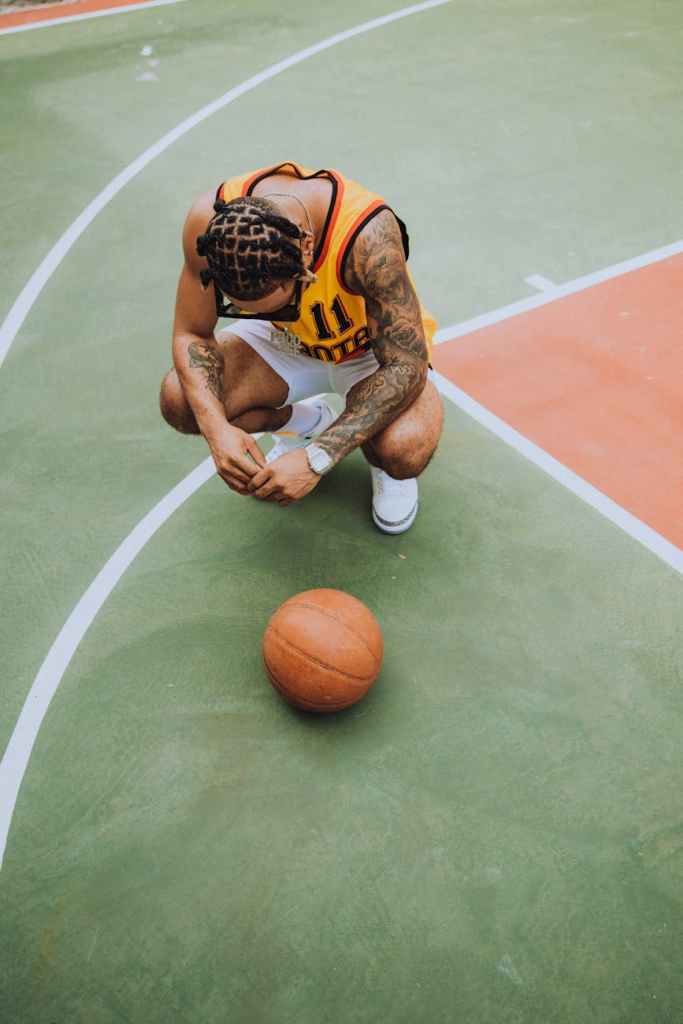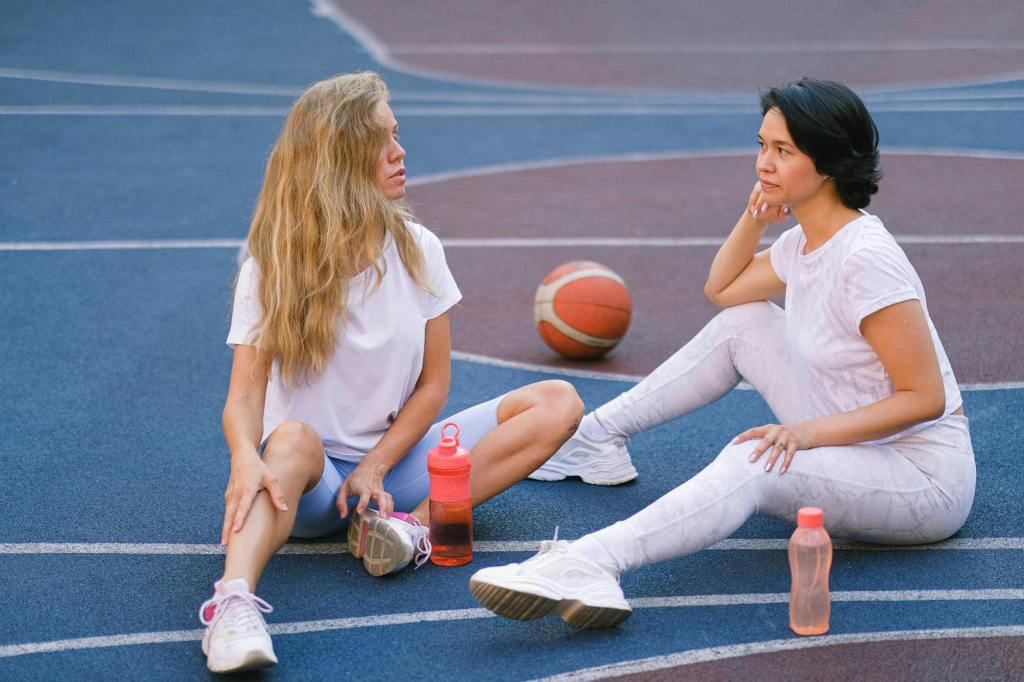
Recently, I’ve been spending a lot of time thinking about basketball – identifying the potential of a match on the journey to the venue, sat observing on the edge of the court, and analysing the state of play on the way home.
In all these conversations I have been struck by the desire of the players to be able to control the proceedings. Hours are invested in practising layups and longshots, observing the form of future opponents, and team practise of pass drills that might give them the advantage. However, despite all this effort to manage things within their control, there is much that the players cannot control – for example, the conditions of the court, the preparation of the other team, the behaviour of the supporters.
In the midst of the match too, it is also just so easy for the players to lose their head. Miss a few shots, and the potential to lose focus is huge. Games either become increasingly frantic as quicker and more erratic shots are risked and the players become more desperate, or the players simply give up, resigning themselves to seemingly inevitable defeat.
From basketball to teacher training
Inevitably, my basketball watching has led me to ponder upon beginning teachers and the parallels with their experience at this time of year.
Being the mentor of a beginning teacher in February/ March can feel pretty challenging. As the pressure of the teaching timetable mounts, beginning teachers often begin to despair or plateau (although they will often perceive this negatively as stagnation). During this period they often begin to lose their focus and motivation; within individual lessons they can become easily thrown off course and find it hard to recover, and they also struggle to envision how they can ever come back from this to experience success or even satisfaction in their work.
Day’s (2006) work on teacher identity proposes that teacher identity is formed of personal, professional and situated identities. This identity can be destabilised when one aspect dominates the others; for example, when the teacher is dealing with ill-health their personal identity may dominate the professional and the situated identity, leaving them at risk of destabilisation. With the right support, this fluctuation can usually be navigated in the short term. However, the goal must be to help the beginning teacher to develop the ‘everyday resilience’ that allows teachers to bounce back from quickly from ‘the routine pressures and unavoidable uncertainties which feature in many teachers’ everyday work and lives’ (Day & Gu, 2013, p.8).
In this period of the plateau/despair, it is more important than ever that mentors keep providing opportunities for their mentees to adopt strategies to accommodate these fluctuations in their identity, for example by building their sense of agency, supporting them to take risks, depersonalising stressful events, sharing resources and routines, building confidence.
In the immortal words of that great basketball musical classic from High School Musical, mentors need to help beginning teachers to:
“Just keep ya head in the game, U gotta get’cha get’cha head in the game.”
Re-examining our mentoring habits

When play begins to disintegrate in a junior basketball match, shouting instructions from the sidelines (as to how the players need to be better) rarely seems to help – in fact when I’ve seen this happen, the players simply seem to become more anxious and frenetic. Similarly, when beginning teachers hit this challenging point in their development and their resilience is inevitably more fragile, we need to reflect carefully on how, when and where we are conveying our observations of their practice. Mentoring methods we have been using fairly successfully to this point can suddenly become fraught with misunderstanding and be met with defensiveness because the mentee is feeling the precariousness of their own situation more keenly. At this point we need to reexamine our own mentoring habits.
Are we falling into the habit of judgementoring (Hobson & Malderez, 2016)?
Judgementoring occurs when we reveal our own assessment of the mentee’s progress through our ‘feedback’ and comments- both criticism and praise – rather than fostering their own reflection and evaluation. Even if we offer feedback as a praise-development-praise sandwich, mentees in this fragile phase of development can fixate on the development points and often begin to reinterpret critique as criticism.
Can we take this opportunity to do something radically different with our observation and feedback practice?
Paring back the number of observations we are undertaking could be really appropriate if the mentee is making sufficient progress in relation to the curriculum. We might instead move to a situation where we plan with mentees in advance which lesson in the week/fortnight will be ‘formally’ observed. In-between, the mentee can then complete their regular observations as a self-evaluation/ reflection exercise. If they find this shift too abrupt, then we might want to offer a couple of these questions to draw their attention to particular elements of the lesson, but these questions need to be phrased in such a way as to avoid judgementoring simply being conveyed in a different form (see below for advice around the post lesson discussion).
Can we change the way we conduct post lesson conversations with beginning teachers?
It’s worth considering how we might begin supporting the beginning teacher’s independence in this post-lesson reflection process and help them to feel greater ownership over their development targets. One way to achieve this is to ask the mentee to identify their preferred observation focus prior to the observation and then centre the post-lesson conversation around this.
Similarly, instead of leaping in to tell the beginning teacher what they need to do to improve, can we reorientate this post-lesson moment, so the beginning teacher leads the feedback? The mentor may need to scaffold this process, but this can be done through asking questions about certain aspects of practice rather than offering judgements. For example: “Tell me about where you hoped the pupils would engage in historical thinking and reasoning in that lesson”, or “I noticed x was doing y, why do you think that was?”, or even “When z happened, what do you think might have changed that situation?”. [Laura London and I call these ‘questions for mentoring conversations’. You can read more about this in London’s chapter on Observation and Feedback in Mentoring History Teachers in the Secondary School (Chapter 6), or a brief introduction can be found in our blog Avoiding the observation trap.]
Get’cha head in the game
Our aim is to support our beginning teachers to independence in their practice. To do so they must become more self-reliant and increasingly less dependent upon their mentors. We need to guard against ‘learned helplessness’ (Maier & Seligman,1976), to help them grow their sense of agency and develop their ‘everyday resilience’. In the midst of this ‘match’ it is just so easy for the players to lose their head, but if we re-examine our mentoring approaches and take a different tack we might just help our beginning teachers to reestablish their sense of control and motivation, and help them get their heads back in the game.
References
Day, C. 2004) A passion for Teaching. London: Routledge Falmer.
Day, C., & Gu, Q. (2013). Resilient Teachers, Resilient Schools: Building and sustaining quality in testing times (1st ed.). Routledge. https://doi.org/10.4324/978020357849
Hobson, A. & Malderez, A. (2013). Judgementoring and other threats to realizing the potential of school‐based mentoring in teacher education. International Journal of Mentoring and Coaching in Education. 2. 89-108. 10.1108/IJMCE-03-2013-0019.
Maier, S. F. and Seligman, M. E. P. (1976), “Learned helplessness: Theory and evidence”, Journal of Experimental Psychology: General, Vol. 105, pp. 3-46.